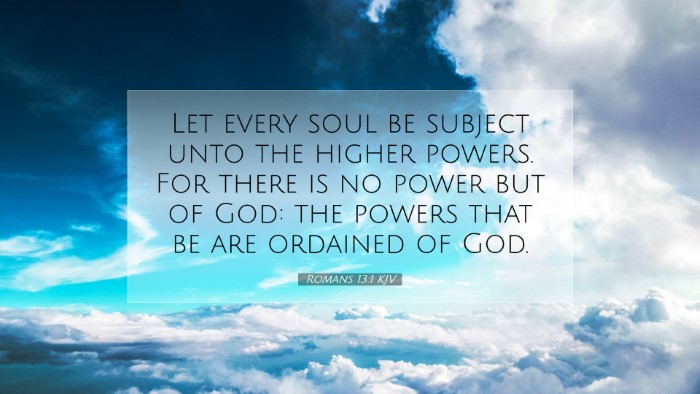Old Testament
Genesis Exodus Leviticus Numbers Deuteronomy Joshua Judges Ruth 1 Samuel 2 Samuel 1 Kings 2 Kings 1 Chronicles 2 Chronicles Ezra Nehemiah Esther Job Psalms Proverbs Ecclesiastes Song of Solomon Isaiah Jeremiah Lamentations Ezekiel Daniel Hosea Joel Amos Obadiah Jonah Micah Nahum Habakkuk Zephaniah Haggai Zechariah MalachiRomans 13:1
Romans 13:1 KJV
Let every soul be subject unto the higher powers. For there is no power but of God: the powers that be are ordained of God.
Romans 13:1 Bible Commentary
Commentary on Romans 13:1
Romans 13:1 declares: "Let every soul be subject unto the higher powers. For there is no power but of God: the powers that be are ordained of God." This verse emphasizes the believer's relationship to governing authorities. In this commentary, we will explore insights from public domain commentaries by Matthew Henry, Albert Barnes, and Adam Clarke.
Contextual Overview
The Apostle Paul writes to the Christians in Rome amidst a political atmosphere that is both rich and complex. The Roman Empire, characterized by its extensive governance and authority, serves as the backdrop against which Paul conveys this teaching. Understanding the context of Rome helps illuminate the significance of submission to authority in the eyes of early Christians.
Understanding Authority
Authority is ordained by God. Both Matthew Henry and Albert Barnes emphasize that all authorities, whether secular or sacred, derive their legitimacy from God Himself. This indicates the divine origin of governance and asserts that resisting authority is tantamount to resisting God's ordinance.
- Henry points out that God's sovereignty extends over all nations, suggesting that He raises rulers for His purposes, regardless of their moral character.
- Barnes elaborates on this, explaining that God's providence allows rulers to act as instruments for maintaining order and justice.
The Nature of Submission
Submission is both a duty and a testimony. Paul’s instruction to be subject to authorities carries significant implications. Adam Clarke notes that submission goes beyond mere compliance; it is an acknowledgment of God's order in society. This principle operates within the framework of Christian faith and conduct.
- Henry argues that submission leads to peace and harmony in society, creating a conducive environment for believers to live out their faith.
- Barnes cautions against any interpretation that would cause believers to neglect their conscience – submission does not allow for the compromise of one's spiritual responsibility.
Application of the Principle
Practical implications of submission to authority. In practical terms, Paul’s exhortation is relevant for all spheres of life, including civil, domestic, and ecclesiastical structures. Subjecting ourselves to higher authorities is an expression of our trust in God's overarching sovereignty.
- Clarke advises that believers should recognize the importance of obeying laws that are consistent with God's moral law.
- Henry emphasizes the importance of prayer for rulers, as they are ultimately accountable to God for their actions, which serves both to support them and to facilitate God’s justice.
Resistance to Authority
Understanding the consequences of resistance. As Paul asserts, those that resist authority resist God's ordinance. This calls for serious reflection on the reasons behind disobedience to civil laws.
- Barnes elaborates that while believers are called to obey civil authorities, this obedience is conditional; it does not extend to unlawful commands that contravene God’s will.
- Henry warns against the dangers of anarchy, suggesting that unrestrained rebellion against authority leads to chaos and disorder, which are contrary to the peace God desires for His creation.
Spiritual Authority vs. Temporal Authority
Balancing the two authorities. The tension between obeying God and recognizing human authorities must be navigated with care. Paul’s teaching does not suggest blind acceptance of all authority but encourages discernment.
- Clarke asserts that believers must prioritize their allegiance to God above human authority when conflicts arise, as exemplified by the apostles’ response to the Sanhedrin.
- Barnes also supports this notion, stressing that obedience to God must supersede obedience to unjust human laws.
Conclusion
Romans 13:1 presents a profound challenge and reminder for Christians regarding their posture towards authority. Combining insights from Henry, Barnes, and Clarke provides a nuanced understanding that emphasizes the divine origin of authority while calling for a balance of obedience to God's will.
As believers navigate their relationship with governing powers, it is essential to hold onto the truth that all authority exists under the sovereign hand of God, who ultimately desires justice, peace, and harmony among His people. Let this understanding not only inform our behavior as citizens but also elevate our witness to the transformative power of the gospel in every area of life.


